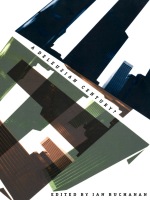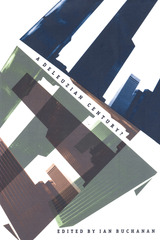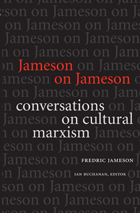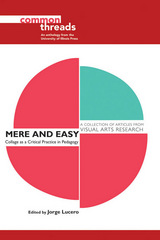
Originally published as a special issue of South Atlantic Quarterly (Summer 1997), this volume includes essays from some of the most prominent American, Australian, British, and French scholars and translators of Deleuze’s writing. These essays, ranging from film, television, art, and literature to philosophy, psychoanalysis, geology, and cultural studies, reflect the broad interests of Deleuze himself. Providing both an introduction and critique of Deleuze, this volume will engage those readers interested in literary and cultural theory, philosophy, and the future of those areas of study in which Deleuze worked.
Contributors. Ronald Bogue, Ian Buchanan, André Pierre Colombat, Tom Conley, Manuel DeLanda, Tessa Dwyer, Jerry Aline Flieger, Eugene Holland, Fredric Jameson, Jean-Clet Martin, John Mullarkey, D. N. Rodowick, Horst Ruthrof, Charles J. Stivale

To show us how Deleuze’s philosophy works, Buchanan begins with Melville’s notion that “a great book is always the inverse of another book that could only be written in the soul, with silence and blood.” Buchanan demonstrates that the figure of two books—one written in ink and the other written in blood—lies at the center of Deleuze’s hermeneutics and that a special relation must be established in order to read the second book from the first. This relation is Deleuzism. By explicating elemental concepts in Deleuze—desire, flow, the nomad—Buchanan finds that, despite Deleuze’s self-declared moratorium on dialectics, he was in several important respects a dialectician. In essays that address the “prehistory” of Deleuze’s philosophy, his methodology, and the utopic dimensions of his thought, Buchanan extracts an apparatus of social critique that arises from the philosopher’s utopian impulse.
Deleuzism is a work that will engage all those with an interest in the twentieth-century’s most original philosopher.

Jameson on Jameson displays Jameson’s extraordinary grasp of contemporary culture—architecture, art, cinema, literature, philosophy, politics, psychoanalysis, and urban geography—as well as the challenge that the geographic reach of his thinking poses to the Eurocentricity of the West. Conducted by accomplished scholars from United States, Egypt, Korea, China, Sweden, and England, the interviews elicit Jameson’s reflections on the broad international significance of his ideas and their applicability and implications in different cultural and political contexts, including the present phase of globalization.
The volume includes an introduction by Jameson and a comprehensive bibliography of his publications in all languages.
Interviewers
Mona Abousenna
Abbas Al-Tonsi
Srinivas Aravamudan
Jonathan Culler
Sara Danius
Leonard Green
Sabry Hafez
Stuart Hall
Stefan Jonsson
Ranjana Khanna
Richard Klein
Horacio Machin
Paik Nak-chung
Michael Speaks
Anders Stephanson
Xudong Zhang


With articles that engage directly—as well as theoretically—with de Certeau, this collection corrects a long-standing imbalance in the criticism by covering works from two periods about which little is known in anglophone circles: his early books on religious history and his midlife histories of mysticism and possession. It also includes critiques from queer theory and feminist theory, as well as comparative readings that assess de Certeau alongside his famous contemporary, Michel Foucault. With articles by an international array of scholars who address both the secular and the religious thinker, this special issue is the most definitive study to date of this important twentieth-century thinker.
Contributors. Jeremy Ahearne, Frederick C. Bauerschmidt, Ian Buchanan, Philippe Carrard, Claire Colebrook, Tom Conley, Verena Andermatt Conley, Catherine Driscoll, Carla Freccero, John Frow, Richard Terdiman, Timothy Tomasik, Marie-Claire Vallois, Graham Ward
READERS
Browse our collection.
PUBLISHERS
See BiblioVault's publisher services.
STUDENT SERVICES
Files for college accessibility offices.
UChicago Accessibility Resources
home | accessibility | search | about | contact us
BiblioVault ® 2001 - 2024
The University of Chicago Press









